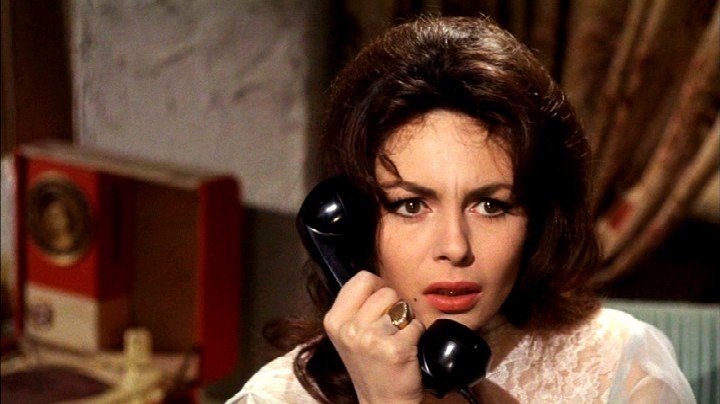One of a number of horror anthologies cranked out for cinemas in the 1960s, Mario Bava’s Black Sabbath is among the better ones.
The Production: 3/5
One of a number of horror anthologies cranked out for cinemas in the 1960s, Mario Bava’s Black Sabbath is among the better ones. Dubbed into English (though there are English speaking actors among the cast members) with its stories shuffled and somewhat cut and with some new introductory lead-ins filmed by Boris Karloff for North American distribution, Black Sabbath is effective if not quite as terrific as it had the potential to be with tighter, more ironic writing and the elimination of one of the three segments.
Any of these mini-movies could have served as fodder for Boris Karloff’s chilling weekly anthology series Thriller, but they work just fine as movie playlets, too. “A Drop of Water” is perhaps the best of the three, so it was wise to lead the film with it (the European version used it as the finale piece, also effective). In it, a nurse (Jacqueline Pierreux) preparing the body of a dead medium for burial steals a valuable ring worn by the corpse and lives to regret it. Director Mario Bava makes great use of startling close-ups and exaggerated but very effective sound effects to instill the feeling of dread in the viewer almost from the moment Helen takes the ring that doesn’t belong to her. Jacqueline Pierreux gives a superlative performance as unnerving events happening all around her drive her to the brink of insanity. Marcello Fondato’s screenplay (with contributions by director Bava and Alberto Bevilacqua) might have made the inevitable theme of unending greed a little more specific in the film’s final moments, but otherwise this segment is the finest.
Regrettably weak in comparison to its sister segments, “The Telephone” uses a tired return-from-the-dead story as a prostitute (Michèle Mercier) is driven to distraction by phone calls from her allegedly deceased gangster/lover whom she had turned in to the police. The narrative isn’t very frightening, the behavior of Rosy who’s being threatened don’t make much sense (she phones her lover’s wife, played by Lydia Alfonsi, for help: probably the last person on Earth who’d want to come to her aid), and Bava films the story with lots of lights on sapping even more suspense from the tale. Michèle Mercier certainly gives a good account of herself in the story, but one just doesn’t care much about her predicament.
Adapted from a story by Aleksei Tolstoy, “The Wurdalak” makes a fine closer to the film. The title refers to a specific vintage of vampires: those who must take the blood of their loved ones in order to survive, and Boris Karloff stars as the patriarch of the family, Gorca, who has been gone five days hunting a wurdalak that threatens his family. He’s told his oldest son Giorgio (Glauco Onorato) not to let him in if he appears even one second after the clock strikes ten on the fifth day. Before the father returns, Count Vladimire d’Urfe (Mark Damon) arrives at the house having found the headless corpse of the wurdalak Gorca had been seeking, and once there, he falls madly in love with Gorca’s beautiful daughter Sdenka (Susy Andersen). Gorca does arrive after the tolling of ten o’clock, but the family is persuaded he’s all right, and he is allowed inside where, of course, the inevitable happens. While tension isn’t quite as tight as it might have been in the segment, and it runs itself out in the expected manner with no real surprises after the first one is staged midway through the segment, Bava still uses an interesting variety of camera angles and a handsome set of ruins in which to stage some of the climactic encounters. Boris Karloff gives a masterful performance as the sullen patriarch, and Mark Damon is fine, too, as the doomed Count.
Video: 3.5/5
3D Rating: NA
Framed at its theatrical 1.85:1 aspect ratio, the image looks reasonably splendid in a widescreen transfer that’s been enhanced for widescreen televisions. Sharpness especially in indoor scenes is first-rate with a surprising amount of detail to be seen in skin textures and hair. Color is rich and bright, too, with appealing skin tones. But long shots, especially in “The Wurdalak,” are very soft, and there is a fair amount of dust specks popping up fairly regularly. Black levels can be quite excellent, but, occasionally, details do get swallowed in the shadows. The movie has been divided into chapters every ten minutes so this disc contains 10 chapters.
Audio: 3.5/5
The Dolby Digital 2.0 sound mix is decoded by Dolby Prologic into the center channel. It’s a typical mono mix of the era with the dubbed English dialogue (often sounding as lifeless and arid as looping often does in low budget movies) mixed in professionally with the newly created score by Les Baxter for the English-language version (while sometimes lowering itself for cheap laughs) and the nicely created atmospheric effects. There is a continual amount of low level hiss, however, that one must accustom himself for while watching this.
Special Features: 0/5
There are no bonus features for this made-on-demand disc.
Overall: 3/5
Black Sabbath has a well-earned reputation as an effective little chiller, but unless one is not Blu-ray ready, the film can readily be found in various Blu-ray versions, some with the original foreign-language version and some with an array of interesting bonus features, for less money than this made-on-demand effort, which is, if one can do no better, certainly a reasonable standard definition alternative.

